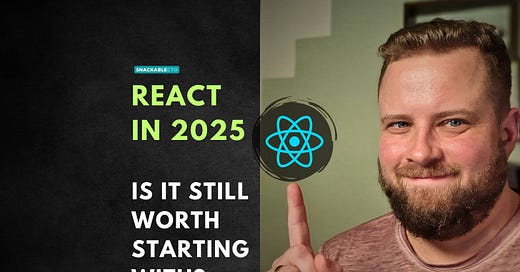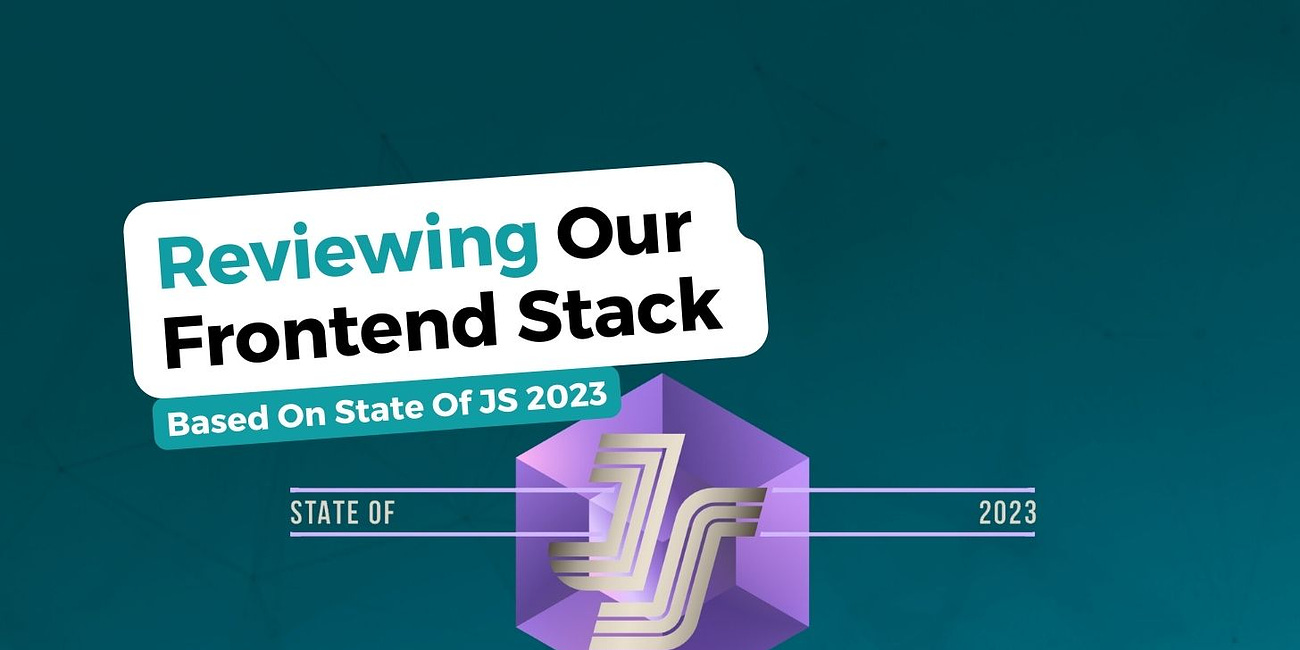Why I Still Believe in React (Even After All These Years)
Starting a journey in technology can be daunting. As someone who has witnessed countless trends come and go, I still defend one decision over and over: choosing React.
The world of web development moves fast, and there are always skeptics questioning whether React, after so many years, is still the right horse to bet on.
🍪 In the last few years, we have built several apps that support seven-figure turnovers in the B2B space with ReactJS1.
Let me tell you why, even in 2025, my answer is still a resounding "Yes."
"Is React Becoming Obsolete?"
"People always say that choosing React is like jumping on a trend and that eventually, you’ll end up with nothing." This statement is the essence of the fear so many developers have. In the fast-paced evolution of JavaScript frameworks, there's a risk of feeling like you’re just following the herd, and that herd might walk right off a cliff one day.
But here's the thing. I've been in this game long enough to witness several technologies promise to overthrow the current leader, only to be surpassed by something shinier. React's critics have said it would fall out of favor for years, yet it hasn't happened.
👉 Why? Because interest and hype are not the same as usage and adoption.
Why React Still Makes Sense
Real-world experience beats hype every single time. And let me share my experience here. My team and I reviewed our tech stack several months ago. We had initially chosen React and Next.js a few years back, and we wanted to reassess if that was still the right decision or if we were just holding on due to the "sunk cost fallacy."
React wasn’t just "good enough" but our best choice. Despite all the buzz around alternatives like Angular, Vue, or web components, none of them had the combination of community support, ecosystem depth, and long-term viability that React offered.
React has not only endured but has evolved. From functional components to hooks, from Next.js for server-side magic to state management options like Tanstack Query, React’s ecosystem is designed to address real problems, not just generate excitement. React’s evolution has been about improvement from within in the last few years—an agile, iterative refinement that feels right for the products we want to build.
I know what you might be thinking, But what about innovation? Isn’t staying with React playing it safe? The truth is that React continues to innovate in ways that really matter; better compilation, enhanced state handling, and improved developer experience. And those innovations don’t happen in a vacuum. They’re built on the back of real-world usage, hundreds of thousands of projects pushing React to its limits and shaping it into a better version of itself.
Why React Keeps Winning
If you're thinking about starting a new project in 2025, React is still an excellent choice. Here’s why.
The first is consistency. React's approach to UI building hasn’t fundamentally shifted—it’s still "UI = f(state)". This simple paradigm makes onboarding new developers much more accessible. When developers move between projects, there are fewer hurdles because the patterns are essentially the same, regardless of where they've worked.
Second, community and ecosystem. There's no other JavaScript framework with an ecosystem quite like React's. Whether you need libraries for state management, server-side rendering, or even mobile development (thanks to React Native), React offers well-supported and battle-tested choices.
And third, adaptability. React’s greatest strength is its ability to fit different needs, from small personal projects to complex enterprise applications. You’re not locked in a paradigm where the tool dictates the solution. React adapts to what you need it to be, making it future-proof.
Key Takeaways
Consistency across projects: React provides a stable development experience, making it easy for teams to adapt, especially when new developers join.
Massive ecosystem: The wealth of tools, libraries, and community resources makes React versatile for almost any web or mobile application.
Real-world evolution: React is constantly being shaped by its user base, meaning its updates are driven by real problems and needs.
Developer experience: Improved onboarding, simpler patterns, and solid tooling make React a developer-friendly choice, especially in startups.
Reviewing Our Frontend Stack Based On State Of JS 2023
One of the most impactful decisions you will make when creating a new application is the tech stack on which the solution will be based. I remember a time when this was a decision just between a handful of ways to do this. These days, you need to read yearly reports to get an idea of what is in and what is out.
In Summary
Yes, there are many options out there. Svelte and Vue are fantastic tools. Web components are stable and predictable.
👉 But if I were to start a new project today, I'd still go with React.
Not because it’s flashy but because it's reliable, adaptable, and supported by a thriving community of developers and companies alike. And that’s precisely what you want when building something meant to last.
React is not about following a trend but choosing a solution with a track record and a future-forward mindset. A solution that works.
What about you? What frameworks or libraries are you considering for your next project, and why? I'd love to hear your thoughts in the comments below.
Additional Resources:
https://react.dev/
















Share this post